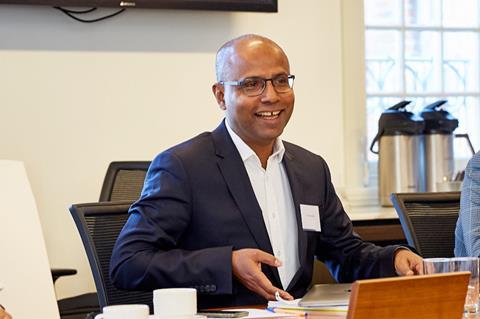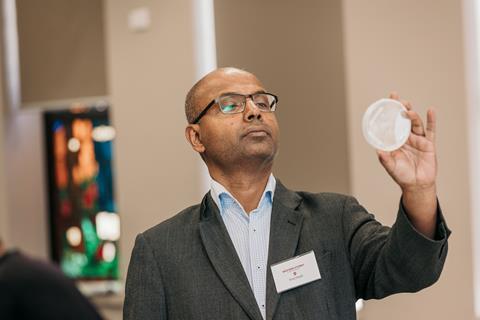Distinguished Professor Brajesh Singh of Western Sydney University has been named as this year’s winner of the Dorothy Jones Prize for microbiology.

The prize is part of the Applied Microbiology International Awards, which celebrate the brightest minds in the field and promote the research, group, projects, products and individuals who continue to help shape the future of applied microbiology.
The prestigious scientific prize is awarded to a scientist who has used microbiology to make a significant contribution to our understanding of terrestrial life, rhizospheres and soil microbiomes, or to the preservation of our global ecosystem.
Prestigious event
Dist Prof Singh was named as winner of the prize at the prestigious EMI lecture 2023, held at BMA House in London on November 16.
A global expert in the field of microbial functional ecology at Hawkesbury Institute for the Environment, Western Sydney University, he spent ten years honing his knowledge in Scotland before relocating to Australia and joining the Institute, becoming Director of the Global Centre for Land-Based Innovation in 2015.
By identifying the quantitative relationships between soil microbial diversity and ecosystem functions and exploring how these are impacted by natural and anthropogenic pressures, Dist. Prof. Singh’s fundamental research provides solutions to global challenges including environmental degradation and food insecurity.
Ecosystem science
Findings from his research identifying the causal link between soil microbial and faunal soil biodiversity and key ecosystem functions and services have advanced crucial areas of ecosystem science and informed multiple policy decisions at regional, national, and global levels, including providing key recommendations for bilateral engagements in agribusiness and trade between Australia and both India and the European Union.

He has developed innovations to boost the efficacy of existing microbial products and provided new tools for manipulating soil and plant microbiomes for an array of industries across Australia and the World.
Dist. Prof. Singh is currently working with multiple government and inter-governmental bodies, including the Food and Agriculture Organisation (FAO) of the United Nations, to train farmers, consultants, and policy advisors in sustainable agriculture, and in the SDGs. In addition, he works with the UN FAO’s Global Soil Partnership to boost the resilience of farming systems and ensure environmentally sustainable food security measures globally. Dist. Prof. Singh also advises the European Commission on enhancing productivity in the bioeconomy.
Prof Singh is a Fellow of the Australian Academy of Science; Soil Science Society of Australia; the Soil Science Society of America, the American Academy of Microbiology, and a Humboldt Research Awardee.
Revolutionising microbiology
The prize is named after Dr Dorothy Jones, who served as President of Applied Microbiology International from 1989 to 1991 and was the third female President of the Society.
In her time as research fellow at the University of Leicester, Dr Dorothy Jones revolutionised the way bacteria were classified by developing new methods for the identification and classifications of microorganisms.
She played a crucial role in establishing the teaching of microbiology within the University of Leicester, which eventually led to separate BScs in microbiology and medical microbiology. Her work led to the reassessment of the taxonomy of most medically important bacteria, and the development of the computer-aided analyses of many tests, which fed directly into the creation of the commercial identification kits used today.
To find out more about AMI’s Grants and Awards programme, visit https://appliedmicrobiology.org/membership-community/grants-awards.html.







No comments yet